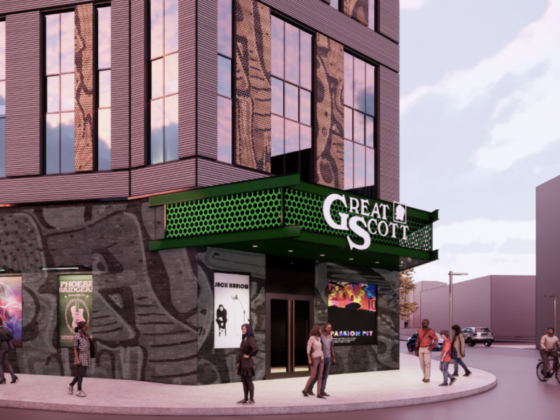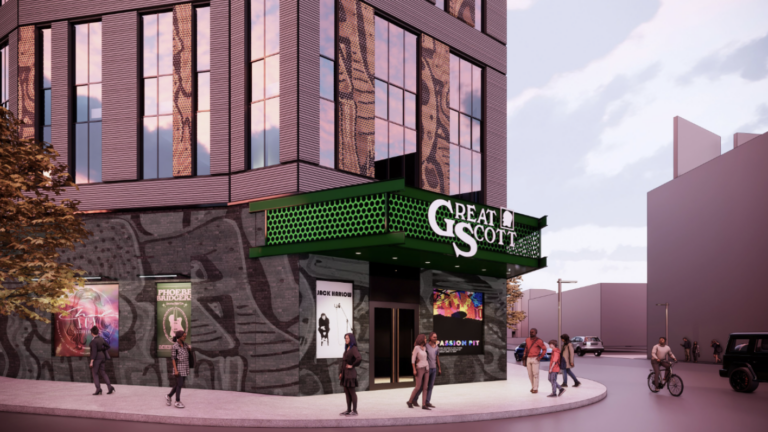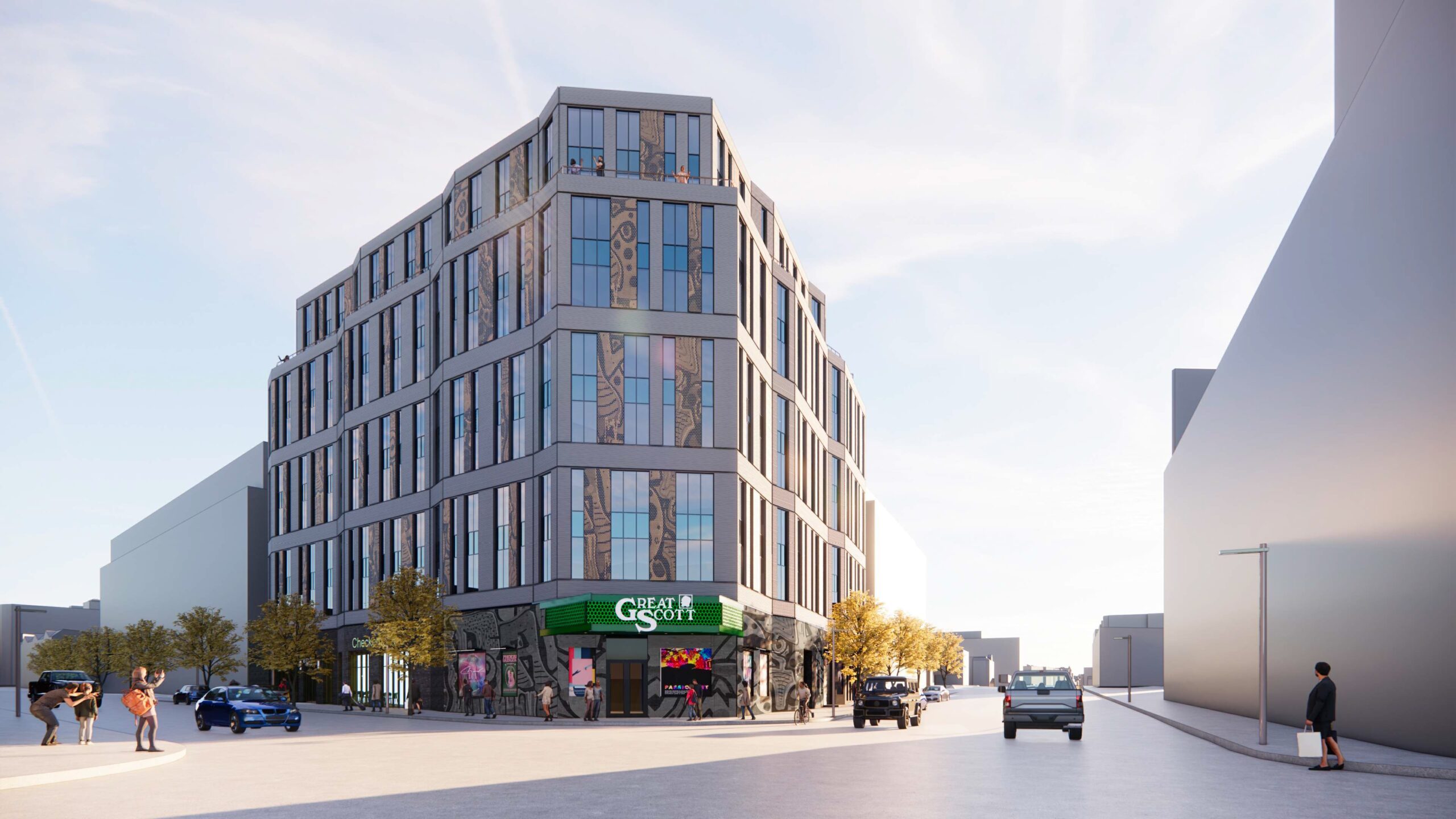No products in the cart.

Great Scott eyes 2027 reopening after go-ahead from Boston’s zoning board
After being rescheduled from July, the Great Scott plan passed the Zoning Board of Appeals last week.

Fans of Great Scott showed up strong for the music venue’s redevelopment plans at last Tuesday’s meeting of the Boston Zoning Board of Appeal. So many supporters joined the online meeting that most of them did not have time to share their messages of support before the board approved the proposal.
The proposed development is for more than just a music venue. It’s for a nine-story, mixed-use building with 139 residential units, 20% of which will be affordable, and 7,100 square feet of ground floor retail space. In the same intersection, the other three corners are set to be redeveloped as well, with a 96-room hotel (without dedicated parking) also in the works.
Advertisement:
With a revamped version of its iconic green awning, the new location will be just two blocks down from the original Great Scott on the corner of Cambridge Street and Harvard Avenue, with a 300-person capacity at Great Scott and 75 at its smaller sister venue, O’Brien’s.

Beginning in 1976, Great Scott was known for hosting little-known performers right before they struck it big. In the past, those included acts like Sugar Ray & the Bluestones and Luther “Guitar Junior” Johnson, and in recent years, Charli XCX, Phoebe Bridgers, MGMT, and Jack Harlow.
“When Great Scott was first forced to close in 2020, there was an incredible public outcry. I didn’t realize that my petition to save the club [that set out to get] 7,500 signatures would make such a difference, but we gathered 25,000,” said Allston resident Wendy Schiller at the meeting.
Advertisement:
In August 2020, Great Scott looked into taking over the former Pizzeria Regina space on Harvard Avenue after crowdfunding almost $200,000, but the space eventually became Hobson’s Bar & Kitchen, according to Vanyaland.
“When Great Scott first closed down, I watched a lot of musicians actually move out of the city, and visual artists as well,” said Trevor McSweeney, the director of operations of Studio 52 Boston, a rehearsal space company. McSweeney also noted that artists left Allston after the Sound Museum, an affordable rehearsal space in Brighton, closed in 2023 after being bought out by a lab developer.
Beyond civilian supporters, Mayor Wu’s Office has come out in support of the redevelopment as well. “The revival of this venue, in addition to sorely needed new housing stock, will help to invigorate the Allston-Brighton arts community,” said Jessica Roberts, the Allston-Brighton liaison of the mayor’s neighborhood services office.
The project also makes the owners of Great Scott and O’Brien’s the landlords of the building.
City Councilor for Allston-Brighton Elizabeth Breadon said, “I am thrilled that this project will both revive Great Scott and retain O’Brien’s Pub, ensuring that two vital music venues remain in Allston for years to come.”
Advertisement:
“The block that [O’Brien’s] sits on has been for sale since [2020]. And we were worried because its future seemed all but guaranteed to go to just another Taco Bell wannabe landlord,” said Schiller, referring to the new occupant of the original Great Scott space.
The other three corners at the intersection of the Great Scott redevelopment will also undergo upgrades.
One corner could be occupied with a proposed seven story hotel, and the other two corners will have six new buildings, including the preservation of Allston Hall and the Allen Building. The other four buildings will offer 244 condos, 103 apartments, and 22,000 square feet of retail space.
Among overwhelming support for the venue, one community member expressed concerns at the meeting about the parking needed to accommodate all of the proposed developments of that intersection, urging the City of Boston to require the building’s future renters to agree not to own a car.
Katie Whewell, a member of the board, said that she’d be “happy to support” such a requirement, but it was not included in the approved redevelopment plans.
The meeting “couldn’t have gone better,” said Jordan Warshaw, one of the three partners of the development, serving as the real estate specialist.
Advertisement:
Now, the 4- to 6-month-long design process begins before ground can break around March 2026, and construction can be completed 12 to 16 months after that, according to Planning Department documents.
Roadblocks to zoning approval
Before Great Scott made it to the Zoning Board of Appeals meeting, there was some confusion on social media and between city officials about the level of community support the venue needed to get on the agenda.
“Just a couple of days before the date of the [July 29] agenda meeting, we were told we were pulled off of it,” and while no reason was given, a mention of the community was included, said Carl Lavin, Great Scott’s music booker and one of the partners of the development.
Great Scott was rescheduled to the September meeting “for reasons I am still trying to ascertain,” said Councilor Breadon.
“Believe it or not, City Hall is now saying we need more public support to give us the final required approval,” Great Scott wrote at the time in an Instagram post on the agenda change. “So let’s show them what ‘community support’ really means.” The venue called for its Instagram followers to email Councilor Breadon and Mayor Wu’s offices.
Great Scott already had 358 letters of support, with only five in opposition, filed with the city before the rescheduling, Great Scott’s attorney said at the meeting. After the post, the number of letters of support sent to the politicians’ offices rose to 1,584, according to the attorney.
Advertisement:
About a week after being knocked off the July agenda, Great Scott was added to the September meeting docket.
While the venue would have preferred an earlier meeting date, the rescheduled date was “within the range of not being a complete disaster for the viability of the project,” said Lavin.
Despite the city’s so-called “red tape,” the overall process for reopening with the City of Boston has been “amazing” and the community support is “overwhelming,” said Lavin.
“We believe there were just some miscommunications that took place … that led some people involved with scheduling not to realize the huge level of community support there had been for this project,” said Warshaw.
Sign up for the Today newsletter
Get everything you need to know to start your day, delivered right to your inbox every morning.




